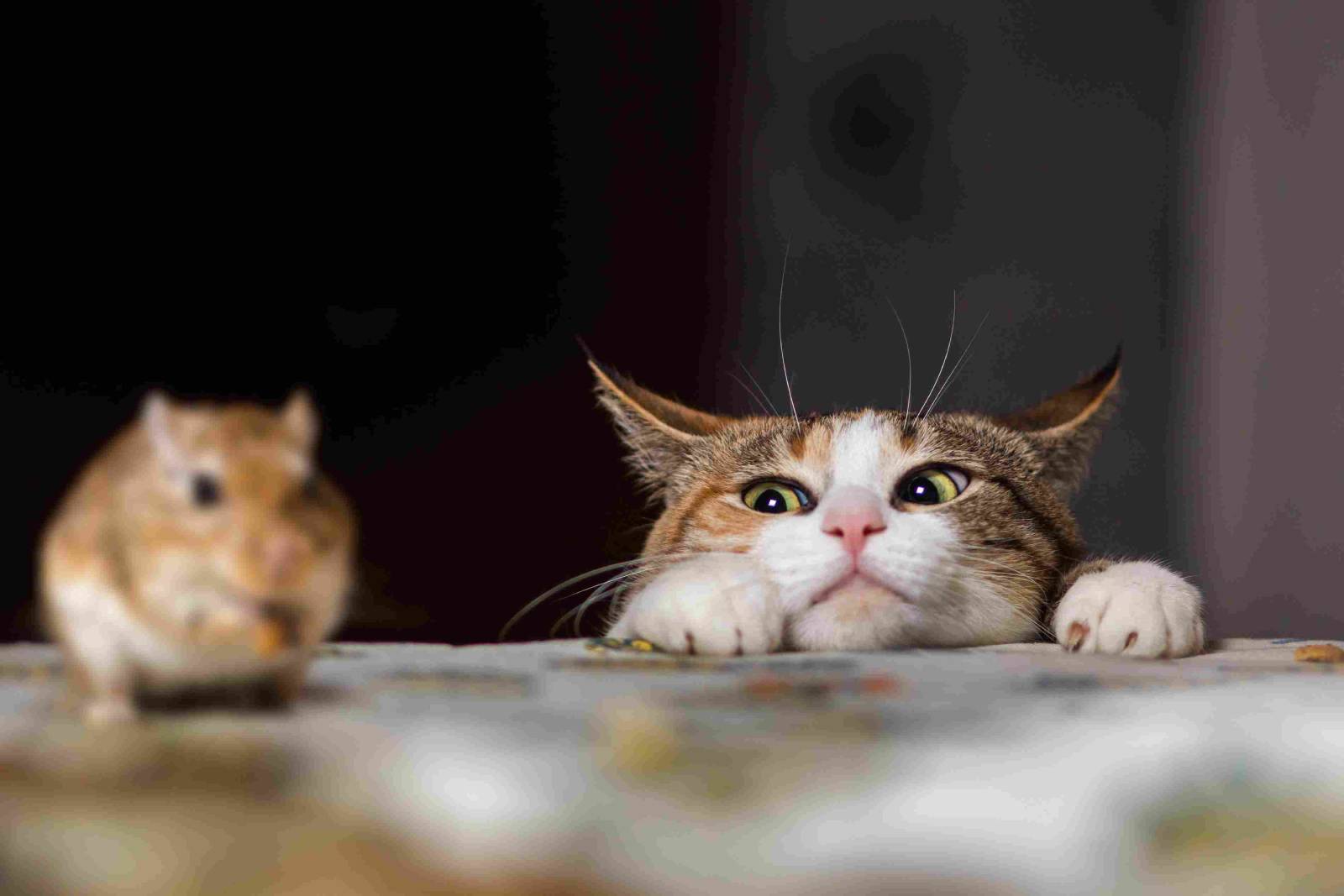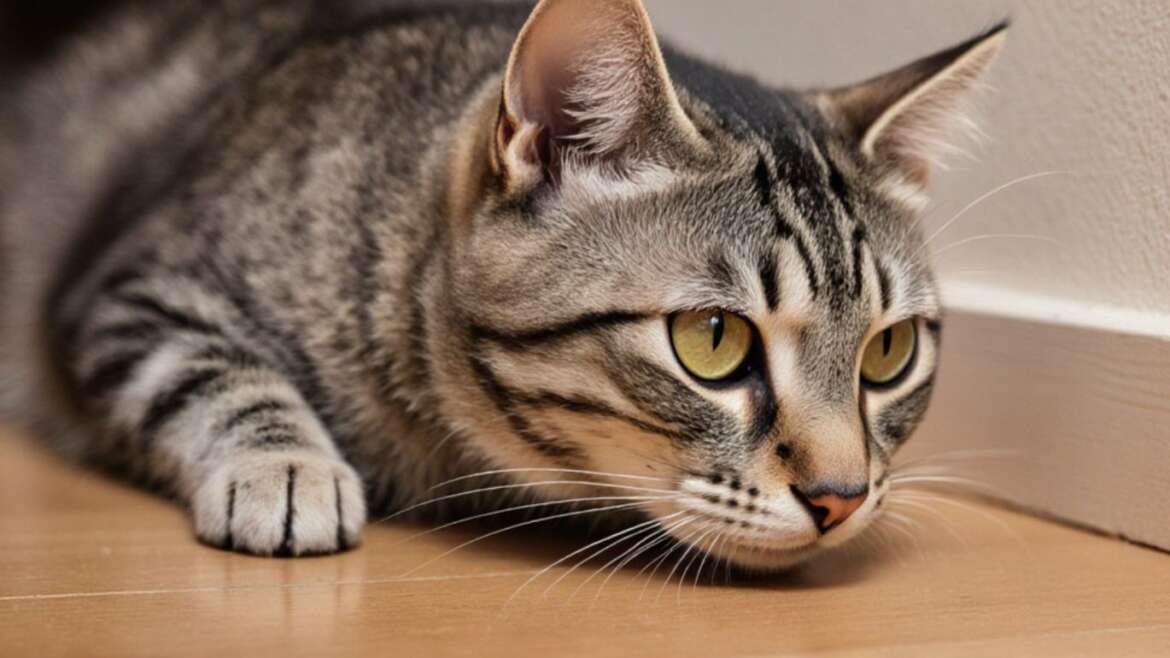Updated: April 30th, 2025
It’s well-known that cats chase mice, while mice instinctively scramble in their presence. This begs the question—do cats really help control mouse populations? Below, we delve deeper into the predator-prey relationship between cats and mice, exploring the nuances of their interactions and providing insights into effective pest management strategies.
The Cat-and-Mouse Relationship
It’s fascinating to consider whether cats actually eat mice. Cats are instinctual hunters, equipped with sharp senses and a deeply ingrained urge to pursue and capture prey like mice. This chasing behavior can be traced back to their ancestry; recent studies have confirmed that domestic cats and European wildcats once belonged to the same species—Felis silvestris. Even though they are now classified as Felis catus, domestic cats still exhibit many of the hunting traits of their wild ancestors.

Why Are Mice Afraid of Cats?
Mice, as prey animals, have evolved acute instincts and heightened senses that help them evade predators. Their fear response is often triggered by specific sights and smells, which can be a critical survival mechanism. For instance, in a study by The Scripps Research Institute, researcher Lisa Stower found that mice can detect pheromones—molecular scents that signal the presence of danger. When they smell cat urine, their brains interpret this as a threatening signal, prompting a quick escape.
Unique Tip: To aid in rodent control, consider using cotton balls soaked in cat urine (if you have a cat) near potential entry points. Mice are less likely to approach if they detect this scent.
Do All Cats Hunt Mice?
While many cats have a natural hunting instinct, not all are adept at catching mice. Factors influence this ability, such as diet and individual personality. A well-fed domestic cat may feel less inclined to hunt, while certain breeds exhibit a lower prey drive. If your cat loses interest after a few minutes of play, it likely won’t be a determined mouser.
Unique Fact: Some breeds, like the Abyssinian and Bengal, are more likely to exhibit strong hunting instincts compared to more docile breeds such as Persians.
How Effective Are Cats for Mice Control?
The presence of a cat might deter some mice, but it is not a guaranteed solution. Mice are highly adaptable and tend to find their way into homes through tiny entry points, especially if they can locate a safe nesting area and accessible food sources. Moreover, a couple of cats may not significantly impact a larger mouse infestation.
Once they detect a predator, mice can easily find refuge in inaccessible spaces, such as behind walls or behind appliances, making it difficult for cats to catch them. Given their rapid reproduction rates, a small initial mouse presence can quickly escalate into a significant issue.
Unique Insight: Mice can squeeze through openings as small as a dime! Regular home inspections for entry points can prevent infestations before they start.
Health and Sanitation Risks for People and Pets
Even if your cat is proficient at catching mice, this may not be entirely safe for your pet or household. Mice can carry diseases such as Lymphocytic Choriomeningitis and Leptospirosis, which pose health risks to both pets and humans. Additionally, any dead mice left behind can create sanitation issues within your home.
Health Tip: If your cat catches a mouse, ensure they are up-to-date on vaccinations and regularly consult your veterinarian about zoonotic diseases.
Alternative Mice Control Options
To effectively prevent mice from nesting in your home, adopting a proactive approach is crucial. Here are several strategies you can implement to deter them:
- Clean Regularly: Store food in airtight containers, clean up crumbs promptly, declutter areas that provide hiding spots, and empty trash cans daily.
- Seal Entry Points: Inspect and block any gaps around doors, windows, and pipes using materials that are rodent-resistant, like stainless steel mesh.
- Tidy Your Yard: Mice often seek shelter outdoors before moving indoors. Ensure that brush, woodpiles, and other potential hiding spots are kept away from the home’s foundation.
Ongoing Care Tip: Consider planting aromatic herbs, such as mint or rosemary, around your home. The strong scent is known to repel mice naturally.
Are DIY Mouse Traps Worth It?
Aside from relying on cats as mouse predators, many homeowners resort to DIY methods for mouse control. Common methods include:
- Snap Traps and Glue Traps: These can be effective but require careful placement and routine checks to ensure they do not inadvertently harm non-target animals.
- Electronic Repellents: High-frequency sound devices claim to deter mice, but their effectiveness can vary significantly among households.
- Bucket Traps: A simple DIY setup using a baited ramp and a bucket can capture multiple mice but may not resolve a full-blown infestation.
Like relying on cats, these DIY solutions may work for small-scale issues but generally fall short against larger infestations. For a long-term solution, contacting professional pest control services is often the most effective approach.
Why Choose Professional Mice Control
When considering mouse control, relying solely on cats is insufficient. Companies like Terminix offer comprehensive pest management solutions, including free inspections to identify susceptible areas and customized plans to eliminate infestations. Their experts utilize advanced strategies to safely eradicate mice and prevent re-entry. With services focused on wildlife exclusion and targeted treatments, Terminix aims to protect your home using proven methods for effective rodent control.
Final Thought: Regularly scheduled pest control maintenance can be crucial in ensuring long-term protection and peace of mind for homeowners.

